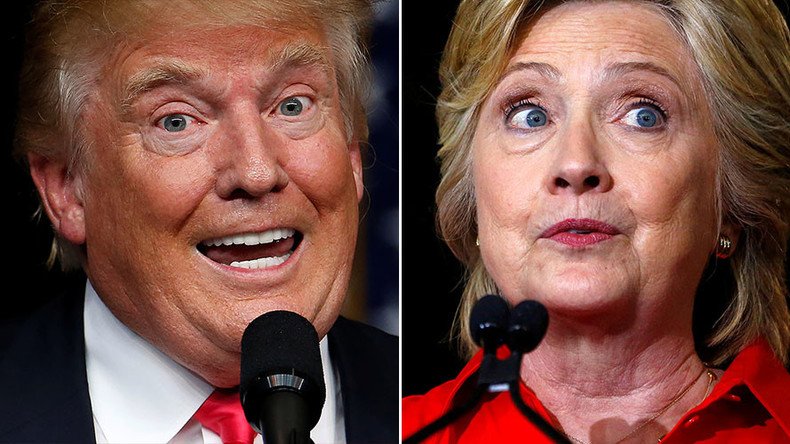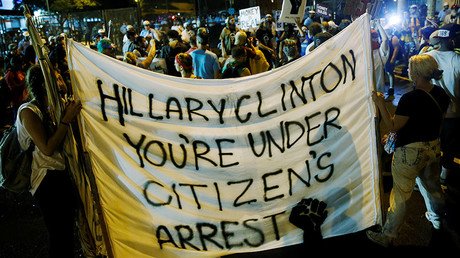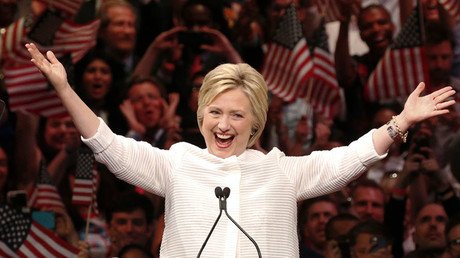Who does the Kremlin want to win: Clinton or Trump?

Despite a concerted campaign in America to link the Republican nominee with the Kremlin, there is no evidence to support the narrative that the Russian government wants Donald Trump to become the next US President.
The novelist Sidney Sheldon, who had a Russian background, once mused that “to be successful you need friends and to be very successful you need enemies.” While there’s little doubt the US establishment shares that view, America’s sheer power and wealth makes it find to hard credible opponents. As a result, they just keep coming back to Russia, in the process bestowing upon it astounding capabilities that contradict the other usual yarn that the country is in terminal decline. Innuendo that this column has previously dubbed 'Russophrenia.'
Thus, the current hysteria about alleged ties between Trump and Vladimir Putin is nothing new. After all, during the last Presidential campaign, failed candidate Mitt Romney described Russia as “America’s number one geopolitical foe.” As it happens, in 2008, John McCain’s running mate, Sarah Palin, suggested in her first major interview that the United States should consider war with Russia one day in order to defend Georgia. The same year, McCain revealed his concern "about a couple of steps the Russian government took in the last few days; one was reducing the energy supplies to Czechoslovakia." A country that hasn't existed since 1993.
For some time now, the Western media has pushed a potboiler which alleges Putin desires a Trump victory in November’s election. Last week, certain pro-Hillary Clinton commentators took things to a new level by insisting that the Kremlin actually controls the businessman-turned-reality-TV-star-turned-politician. Indeed, The New York Times’ most prominent columnist, Paul Krugman, has even dubbed him “the Siberian candidate” - a smear meant to invoke memories of The Manchurian Candidate, a 1960’s Frank Sinatra movie in which 'old blue eyes' discovers his protégé has betrayed America to serve an international Communist plot.
Putin's Busy Everywhere
Fundamentally, these conspiracy theorists want people to believe the Russian government is manipulating democratic battles across the globe, from Brexit to the US election and beyond. Meanwhile, in the real world, the Kremlin is preoccupied with stabilizing food prices and getting a handle on inflation in Russia. So, Hillary’s supporters, with straight faces, are telling you that an administration that is struggling to return its own country to economic growth is so all-powerful that it can dictate who Americans choose to run their country. This does not compute.
In the popular American press, commentators on Russia very often have ancestral roots in the old Russian empire - Krugman himself is the grandson of Belorussian immigrants - and therefore they generally know quite a bit about the history of Russia and its neighbours. However, judging from the hackneyed clichés, which have become a trademark of their writings, they don’t seem to be very well briefed on contemporary state-of-play in the region. In this they are similar to Irish Americans who often believe they know better about how to fix the Ulster question than people who actually live there. This form of ‘support’ was especially unhelpful during the decades of violent troubles in the province and it’s repeating itself now when it comes to the internal dynamics of the former Warsaw Pact area.
To anyone who lives in Russia, or has spent considerable time here, the notion that Moscow could recruit Trump and bend him to its bidding is frankly preposterous. Russia remains a great power, but one with considerable domestic challenges, economically and socially. As a consequence, its authorities, to state the completely obvious, have better things to do than conniving overseas on this scale. Not to mention that Trump is so erratic that you’d barely trust him with a drinks order, let alone a plan so cunning and convoluted that even John Le Carré wouldn’t touch it. It’s really that ludicrous.
The Sound on the Ground
The feeling amongst Moscow’s expert community is that the Kremlin has no idea about which candidate it favors. Both have so many negatives that it has come down to a choice of who will be the least evil of two lessers. But let’s talk about what we do know.
Firstly, it’s probable that Putin personally dislikes Hillary and there are two reasons why this appears to be the case. Back in 2011, during liberal opposition protests in Moscow, Clinton openly interfered, which wasn’t a very clever thing to do. Quite understandably, the Kremlin was furious and Putin publicly exhibited his own feelings of betrayal, so soon after a supposed “re-set” in relations.
“I looked at the first reaction of our US partners,” Putin said. “The first thing the Secretary of State (Hillary) did was say that they (the election) were not honest and not fair, but she had not even yet received the material from the observers. She set the tone for some actors in our country and gave them a signal,” he explained. “They heard the signal and with the support of the US State Department began active work.” It’s worth noting that, in Russia, “active work” is an old description for undercover KGB operations.
Then in 2014, things got even worse. There’s no easy way of putting this but Hillary, while assessing post-coup events in Ukraine, basically compared Putin to Hitler. The President responded by jibing she had "never been too graceful with her statements.”
Armed with this knowledge, it’s reasonable to assume that Putin is not very excited about a putative US supremo, who in a moment of remarkable hyperbole, equated him to a man responsible for the deaths of millions of Russians. But that doesn’t mean Putin, a politician of immense experience, is overjoyed about the prospect of Trump either. If mere words were all it took to discommode the President, he’d hardly have survived close to two decades on the frontline of Russian politics.
A Top Trump?
And so this brings us to the man they call ‘the Donald.’ It's hard to swallow the notion that Russia’s highly educated elite could favor anybody this uncouth and unstable. His foreign policy suggestions on NATO might sound like music to Kremlin ears, but the rest of his platform doesn’t. Trump isn’t merely proposing an American rethink on NATO-area Europe, but a wider American withdrawal from the world and an extremely isolationist outlook.
For a start, Western Europe, which boasts the British and French militaries among others, is well able to defend itself anyway, if push comes to shove. In addition, somewhat paradoxically, a complete American retrenchment would not be in Russia’s interests because, without Uncle Sam’s watchful eye, it would probably lead to an explosion in regional conflicts across Eurasia. And that, in turn, would result in a surge in the proliferation of nuclear weapons – something to which the Kremlin has always been highly opposed.
Then there is the issue of Trump's very vocal encouragement for an expansion of the US fracking industry. In 2013, oil and gas revenues accounted for 68 percent of Russia's total export revenues and the price crash of the past two years has severely wounded the Kremlin's finances. Further growth in US oil production would effectively kibosh prospects of a sustained rise in oil prices, which would be very bad news for Moscow.
Currently, it suits Hillary Clinton’s campaign team and her media advocates to push the McCarthy-ite spiel that Trump is in league with a foreign power that is not presently considered a friend in Washington. For their part, Trump sympathizers have hit back with evidence that his opponent has had palpable financial associations with Moscow herself.
🤔https://t.co/lhnJjIJfkLpic.twitter.com/QUhOXyFowV
— Nick Confessore (@nickconfessore) August 1, 2016
Meanwhile, the Kremlin's silence suggests it might be heeding the advice of Napoleon, who once remarked: “never interrupt your enemy (sic) while he is making a mistake.”
Because, clearly, this whole situation is a gigantic snafu. Let’s face it, America’s political system, which they’ve been trying to get Russia to emulate for the past few decades, has thrown up two deeply flawed candidates. While Trump’s rhetoric on Russia looks promising, when viewed from Moscow right now, there’s no certainty he would remain consistent. And the US has previously seen Presidential candidates who were conciliatory towards Russia while campaigning, but proved different in office. Jimmy Carter and John F. Kennedy immediately spring to mind in that regard. By contrast, Ronald Reagan talked tough on the hustings, but made huge efforts to find accord with Mikhail Gorbachev as Commander-in-Chief.
While Trump is an unknown quantity, Hillary is another story entirely. What you see from her is probably what you will get. Sure, Moscow is hardly enthusiastic about what it can visualize right now, but it’s probably more comfortable than flying blind.
So who does the Kremlin favor between Trump and Hillary? Most likely neither of them.
The statements, views and opinions expressed in this column are solely those of the author and do not necessarily represent those of RT.















